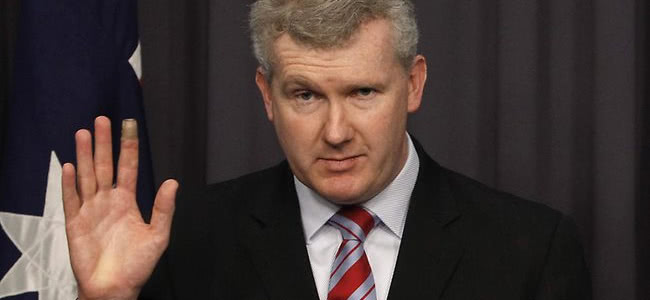Despite fears that the recent changes to ministry that came as a result of last week’s leadership spill may interfere with its progress, Tony Burke has assured the public that the recently announced National Cultural Policy, Creative Australia, will be implemented in full.
Following the sudden sacking of Simon Crean, Burke was sworn in yesterday as the new Federal Arts Minister.
Speaking to The Australian, Minister Burke states, “I think the policy’s great and it’s an honour to have the opportunity to implement it,” he said. “Those commitments are government policy… and I am getting ahead with implementing them.”
A guitarist and opera-goer, Burke is an avid supporter of the arts, and according to a statement from Prime Minister Julia Gillard swearing in the change of office, “he has a longstanding interest in the arts and was a keen recruit to the task.”
Burke’s plate is filling up quickly, with Arts being just one of his many portfolios, along with Sustainability, Environment, Water, Population and Communities.
Executive Director of Australian Performing Arts Centres Association, Rick Heath, told the Sydney Morning Herald that being Minister for Communities would be beneficial to Burke’s Arts position as “greater engagement by communities with touring work around the country,” is necessary.
Minister Burke will be assisted by Michael Danby, who was promoted to Parliamentary Secretary for Arts in the recent cabinet overhaul. According to the Prime Minister, Danby’s “lifelong commitment to the arts started when, as a teenager, he worked in his mother’s art gallery.”“I think the [National Cultural] policy’s great and it’s an honour to have the opportunity to implement it” – Tony Burke
The National Cultural Policy, Creative Australia includes a large number of revisions, including additional funding for young artists and indigenous languages, aims to increase the competitiveness for the local film industry, but specifically to the music industry, the biggest move is the $75.3 million dedicated to a dramatic overhaul of the Australia Council, to cut red tape and modernise its infrastructure.
There is also a $20.8 million pledge towards not-for-profit training organisations, including the Australian Youth Orchestra and National Academy of Music, and the new $8.1 million Creative Young Stars sceme, in which MPs will hold their own ‘talent quests’ to award young talent with grants; as well as re-announcing contemporary music funding, with $1.75 million going to Sounds Australia to help grow domestic and export markets, and $1.25 for ‘career pathways’ for musicians, with details still foggy.
Additionally the National Cultural Policy will invest $2.4 million over four years towards the Australian Music Radio Airplay Project (AMRAP), ensuring its survival after it was nearly run into the ground after it was left out of the Federal Government’s budget last year.
The new funding initiatives outlaid in the National Cultural Policy already provoked mixed responses from the music industry, but the general tone was positive that the Federal Government were taking steps in the right direction in supporting the nation’s arts and music sectors.
Encompassing musicians, artists, designers and their respective staff, the creative industries make up approximately 5.3 percent of the Australian workforce, according to analysis of the 2011 census data conducted by a Brisbane think tank, reports The Australian.
Said think tank, Australian Research Council Centre of Excellence for Creative Industries and Innovation, is headed by Stuart Cunningham, who argues that despite what could be seen as minimal funding, the National Cultural Policy acknowledges that the creative industries are integral to Australian culture.
In his recently published book, Hidden Innovation: Policy, Industry and the Creative Sector, Cunningham said “while you could certainly quibble about how much money is being spent on the sector in the cultural policy, the fact that the terms are used in an unproblematic and quite extensive way would suggest ready acceptance of the term.”
Tone Deaf contacted Arts Minister Tony Burke for comment about adding the Arts to his portfolio, but he was unavailable at the time of publication.

































